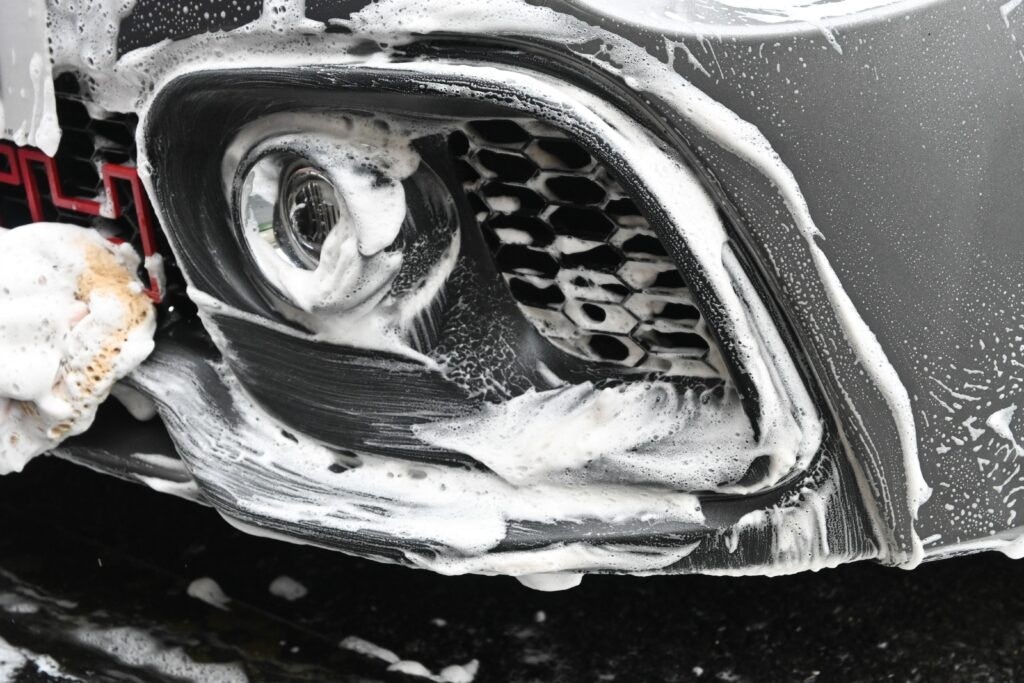Car scratches are more than just a cosmetic nuisance; they can actually compromise your vehicle’s bodywork integrity and pave the way for rust. Addressing these imperfections promptly is essential to maintain your car’s appearance and prevent more serious, costly problems down the line. Whether you’re dealing with minor surface-level blemishes or deeper, more noticeable gouges, understanding the best methods for scratch removal – both DIY and professional – can save you money and keep your car looking its best.
This guide will walk you through everything you need to know about car scratch repair in the UK, focusing particularly on the costs involved.
DIY Car Scratch Repair: Is It Possible?
Preparing your car by thoroughly cleaning the scratched area is the first crucial step in any scratch repair process.
Yes, you can indeed fix car scratches yourself, and for many minor scratches, it’s a perfectly viable option. The success of DIY repair largely depends on the depth and severity of the scratch. Light scratches, often appearing as white streaks on the car’s surface, are typically the easiest to tackle at home. DIY methods are not only convenient but can also be significantly more cost-effective than professional repairs.
For superficial scratches, all you’ll generally need are readily available products like polishing compounds and microfiber cloths. These items can be found at most home goods or automotive retailers. However, it’s important to accurately assess the scratch depth before you begin.
Identifying the Scratch Depth
Before diving into DIY repair, determine how deep the scratch is. A simple test is to run your fingernail gently across the scratch.
- Superficial Scratches: If your fingernail doesn’t catch in the scratch, it’s likely a surface scratch that has only affected the clear coat. These are ideal candidates for DIY repair.
- Deeper Scratches: If your fingernail catches, the scratch is deeper and may have penetrated the clear coat and reached the paint layer or even the primer. While DIY repair is still possible, it might require more steps and products, like touch-up paint.
- Severe Scratches: Scratches that expose bare metal are considered severe. These require immediate attention to prevent rust and will likely benefit from professional repair to ensure proper sealing and color matching.
Tools and Materials for DIY Scratch Removal
For DIY car scratch repair, gathering the right tools and materials is key. Here’s a list of what you might need:
- Car Wash Soap and Water: Essential for cleaning the area before and after repair.
- Microfiber Cloths: For cleaning, applying polish, and buffing.
- Polishing Compound: Specifically designed to remove minor scratches and swirl marks from the clear coat.
- Touch-Up Paint (Matching Car Colour Code): Necessary for deeper scratches that have gone through the clear coat.
- Clear Coat (if using Touch-Up Paint): To protect the touch-up paint and blend the repair seamlessly.
- Fine-Grit Sandpaper (for Deep Scratches): To level the surface after applying touch-up paint, used very cautiously.
- Wax or Car Polish (Finishing): To restore shine and protect the repaired area.
Step-by-Step DIY Scratch Repair Guide
Follow these steps to effectively remove minor car scratches yourself:
- Assess the Scratch: Determine the depth and extent of the scratch to choose the appropriate repair method.
- Clean the Area: Wash the scratched area and the surrounding paintwork thoroughly with soapy water to remove dirt, wax, and debris. Rinse and dry completely.
- Apply Polishing Compound: Apply a small amount of polishing compound to a microfiber cloth. Using circular motions and light pressure, rub the compound into the scratch.
- Buff the Area: Use a clean, dry microfiber cloth to buff the area vigorously. This process helps to remove the scratch and restore the clear coat’s shine.
- Re-assess: Check if the scratch is still visible. For very light scratches, polishing might be sufficient.
- Touch-Up Paint Application (for Deeper Scratches): If the scratch is deeper, carefully apply thin layers of touch-up paint to the scratch using a fine brush or applicator, allowing each layer to dry fully before applying the next.
- Sanding (If Necessary): If the touch-up paint is uneven after drying, use extremely fine-grit sandpaper (e.g., 2000-grit or higher) to gently level it. Wet sanding is often recommended (using water as lubricant). Proceed with caution to avoid damaging surrounding paint.
- Clear Coat Application (If Needed): If you used touch-up paint, apply a thin layer of clear coat over the repaired area to protect the paint and enhance the shine.
- Final Buff and Polish: Once everything is dry, use a polishing compound again to blend the repaired area with the surrounding paint and restore a smooth, even finish. Finish with a wax or sealant to protect your work.
- Inspect: Examine the repaired area in good lighting to ensure the scratch is no longer visible and the finish is smooth and blended.
When to Consider Professional Car Scratch Repair
For deeper or more extensive car scratches, seeking professional repair services is often the most effective solution.
While DIY methods work well for minor scratches, there are situations where professional car scratch repair is the better, or even necessary, option.
- Deep Scratches Reaching Primer or Metal: If a scratch is deep enough to expose the primer or bare metal, professional repair is highly recommended. These scratches are more complex to fix properly and require expertise to prevent rust and ensure a seamless finish.
- Extensive Scratch Damage: If your car has multiple scratches or a large scratched area, professional services can handle the job more efficiently and effectively, often providing a more uniform and high-quality repair.
- Colour Matching Challenges: For certain car colours, especially metallic or pearlescent finishes, achieving a perfect colour match with DIY touch-up paint can be difficult. Professionals have access to advanced colour matching technology and paint mixing systems to ensure an invisible repair.
- Lack of Confidence or Time: If you’re not confident in your DIY skills or simply don’t have the time to dedicate to car scratch repair, opting for professional service is a stress-free solution.
- Leased Vehicles or Resale Value: For leased vehicles, it’s crucial to return them in excellent condition to avoid charges. Professional repair ensures high standards. Similarly, if you’re planning to sell your car, professional scratch repair can help maintain or improve its resale value.
How Much Does Professional Car Scratch Repair Cost in the UK?
The cost to repair car scratches professionally in the UK varies significantly based on several factors. Understanding these factors can help you estimate the potential expenses and budget accordingly.
- Severity of the Scratch: As with DIY repairs, the depth and extent of the scratch are primary cost factors.
- Superficial Scratches (Clear Coat Only): These are the least expensive to repair professionally. Prices can start from around £50 to £100 per scratch. Techniques like polishing and buffing might be sufficient.
- Deeper Scratches (Reaching Paint Layer): Repairs for scratches that have penetrated the clear coat and reached the paint layer are more costly, ranging from £200 to £300 or more per scratch. These often require sanding, filling, painting, and clear coating.
- Very Deep Scratches (Exposing Metal): These are the most expensive, particularly if rust has begun to form. Costs can exceed £300 per scratch and may involve bodywork and rust treatment.
- Size and Location of the Scratch: Larger scratches and scratches in prominent or hard-to-reach areas might incur higher labour costs.
- Type of Car and Paint: Luxury vehicles or those with complex paint finishes (metallic, pearlescent, matte) can be more expensive to repair due to the specialized paints and techniques required.
- Repair Method Used: Different repair techniques impact cost:
- Mobile Scratch Repair Services: Often more convenient and sometimes more affordable for minor to moderate scratches.
- Body Shops: Equipped for more extensive damage and complex repairs, generally more expensive but offer comprehensive services and higher quality for significant damage.
- Geographic Location: Prices can vary across the UK, with London and the South East typically being more expensive than other regions.
- Number of Scratches: Some repair shops offer discounts for repairing multiple scratches at once.
Getting an Accurate Quote: To get a precise estimate, it’s best to get quotes from a few local body shops or mobile repair services. Many providers offer online quote tools where you can upload photos of the damage for an initial assessment.
Will Car Insurance Cover Car Scratch Repair?
Generally, standard car insurance policies in the UK do not cover minor cosmetic damage like car scratches, especially if they are deemed to be just surface level or from wear and tear. Car insurance is primarily designed to cover damages resulting from accidents, collisions, theft, or vandalism.
However, there are exceptions and scenarios where your insurance might play a role:
- Vandalism: If your car scratches are a result of deliberate vandalism (e.g., keying), your comprehensive car insurance policy may cover the repair costs. You’ll typically need to report the incident to the police and provide a crime reference number to your insurer. However, keep in mind that claiming on your insurance will usually involve paying an excess, and it could potentially affect your future premiums.
- Accident Damage: If the scratches occurred as part of a larger accident that is covered by your insurance, the scratch repair would likely be included in the overall claim.
- Uninsured Driver: If your car was scratched by an uninsured driver and you have an uninsured driver protection clause in your policy, you might be able to claim for the damages.
- Optional Add-ons: Some insurance policies offer optional add-ons that specifically cover cosmetic damage. Review your policy details or speak with your insurer to check if you have such coverage.
Is it Worth Claiming on Insurance? For minor scratch repairs, it’s often not financially sensible to make an insurance claim. The cost of your excess and potential increase in future premiums could outweigh the repair cost, especially for superficial scratches that are relatively inexpensive to fix privately.
FAQs About Car Scratch Repair Costs
Can a car scratch fail an MOT?
Yes, but only if the scratch is severe enough to affect the structural integrity or safety of the vehicle. For instance, rust resulting from deep scratches in critical areas could be a MOT failure point. Superficial scratches that are purely cosmetic will not cause an MOT failure.
Can you spray paint car scratches?
Yes, spray paint can be used for car scratch repair, particularly for DIY touch-ups. However, achieving a professional-looking finish requires skill, proper preparation (sanding, priming), and precise colour matching. It’s crucial to use automotive-grade spray paint and clear coat for durability and best results.
Does WD-40 remove car scratches?
WD-40 can temporarily reduce the appearance of very light surface scratches or scuff marks as it adds a temporary shine and can fill in minor imperfections. However, it doesn’t actually remove scratches and its effects are not long-lasting. It’s not a recommended solution for scratch repair.
Can toothpaste remove car scratches?
Toothpaste can sometimes minimise the appearance of very fine, superficial scratches in the clear coat. Mildly abrasive toothpastes can act as a very light polishing compound. However, it’s not a reliable or long-term solution, and dedicated car polishing compounds are far more effective and safer for your car’s paint.
Making an Informed Decision on Car Scratch Repair
Understanding the costs associated with car scratch repair in the UK, along with your DIY capabilities and insurance coverage, empowers you to make informed decisions. For minor scratches, DIY repair can be a cost-effective solution. For deeper or more extensive damage, or if you’re concerned about maintaining your car’s value and finish, professional repair is a worthwhile investment. Always consider getting a few quotes to understand the range of costs and services available to keep your car looking its best.


